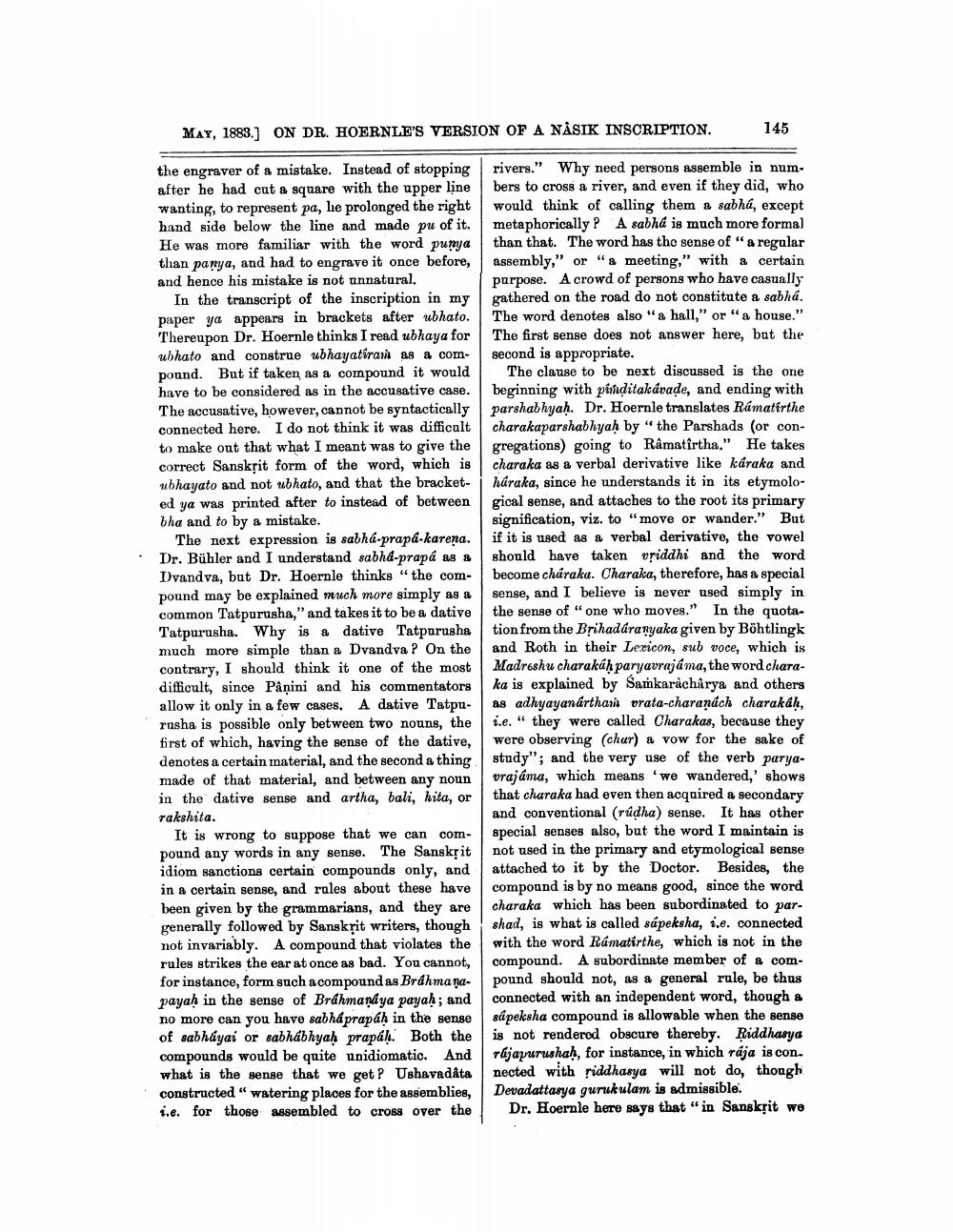________________
MAY, 1883.) ON DR. HOERNLE'S VERSION OF A NÅSIK INSCRIPTION.
145
the engraver of a mistake. Instead of stopping rivers." Why need persons assemble in numafter he had cut a square with the upper linebers to cross a river, and even if they did, who wanting, to represent pa, le prolonged the right would think of calling them a sabhá, except hand side below the line and made pu of it. metaphorically? A sabhá is much more formal He was more familiar with the word punya than that. The word has the sense of "a regular than panya, and had to engrave it once before, assembly," or "a meeting," with a certain and hence his mistake is not annatural.
purpose. Acrowd of persons who have casually In the transcript of the inscription in my gathered on the road do not constitute a sabhá. paper ya appears in brackets after ubhato. The word denotes also "a hall," or "a house." Thereupon Dr. Hoernle thinks I read ubhaya for The first sense does not answer here, but the ubhato and construe wbhayatiran as a com- second is appropriate. pound. But if taken as a compound it would The clause to be next discussed is the one have to be considered as in the accusative case. beginning with pilditakdvade, and ending with The accusative, however, cannot be syntactically parshabhyah. Dr. Hoernle translates Ramatirthe connected here. I do not think it was difficult charakaparshabhyah by “the Parshads (or conto make out that what I meant was to give the gregations) going to Râmatîrtha." He takes correct Sanskrit form of the word, which is charaka as a verbal derivative like káraka and ubhayato and not ubhato, and that the bracket- haraka, since he understands it in its etymoloed ya was printed after to instead of between gical sense, and attaches to the root its primary bha and to by a mistake.
signification, viz. to "move or wander." But The next expression is sabhá-prapa-karena. if it is used as a verbal derivative, the vowel Dr. Bühler and I understand sabhd-prapa as a should have taken vriddhi and the word Ivandva, but Dr. Hoernle thinks "the com- become cháraka. Charaka, therefore, has a special pound may be explained much more simply as a sense, and I believe is never used simply in common Tatpurusha," and takes it to be a dative the sense of "one who moves." In the quotaTatpurusha. Why is a dative Tatpurusha tion from the Brihadaranyaka given by Böhtlingk much more simple than a Dvandva ? On the and Roth in their Lecicon, sub voce, which is contrary, I should think it one of the most Madroshu charakúh paryavrajáma, the word charadifficult, since Påņini and his commentators ka is explained by Sankaracharya and others allow it only in a few cases. A dative Tatpu- as adhyayanárthari vrata-charanách charakák, rusha is possible only between two nouns, the i.e." they were called Charakas, because they first of which, having the sense of the dative, were observing (chur) a vow for the sake of denotes a certain material, and the second a thing study"; and the very use of the verb paryamade of that material, and between any noun vraj ama, which means 'we wandered,' shows in the dative sense and artha, bali, hita, or that charaka had even then acquired a secondary rakshita.
and conventional (rúdha) sense. It has other It is wrong to suppose that we can com- special senses also, but the word I maintain is pound any words in any sense. The Sanskrit not used in the primary and etymological sense idiom sanctions certain compounds only, and attached to it by the Doctor. Besides, the in a certain sense, and rales about these have compound is by no means good, since the word been given by the grammarians, and they are charaka which has been subordinated to par. generally followed by Sanskrit writers, though shad, is what is called sápeksha, i.e. connected not invariably. A compound that violates the with the word Rúmatirthe, which is not in the rules strikes the ear at once as bad. You cannot, compound. A subordinate member of a comfor instance, form such a compound as Brdhmana- pound should not, as a general rule, be thus payah in the sense of Bráhmandya payah; and connected with an independent word, though a no more can you have sabháprapah in the sense súpeksha compound is allowable when the sense of sabháyai or sabhábhyah prapák. Both the is not rendered obscure thereby. Riddhasya compounds would be quite unidiomatic. Andrájapurushah, for instance, in which rája is con. what is the sense that we get ? Ushavadáta nected with riddhasya will not do, though constructed "watering places for the assemblies, Devadattasya gurukulam is admissible. i.e. for those assembled to cross over the Dr. Hoernle here says that "in Sanskrit we




